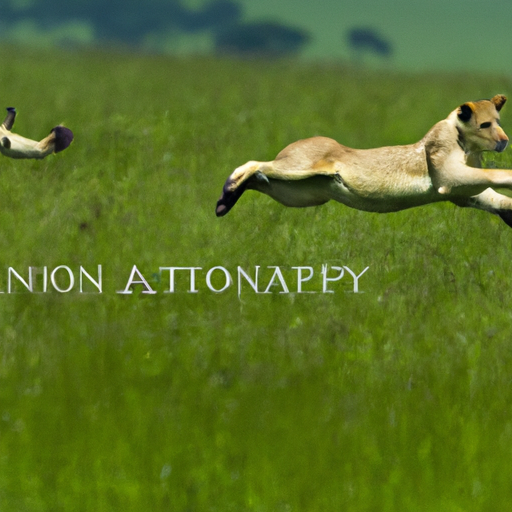So, you’re curious about the hunting behavior of African lions? Well, imagine this – you find yourself in the vast grasslands of Africa, surrounded by the mesmerizing beauty of nature. Suddenly, a majestic lioness appears, her eyes fixed on a herd of wildebeests in the distance. With a calculated stealth, she crouches low in the tall grass, muscles tensing in anticipation. In a split second, she launches herself forward, sprinting with incredible speed and agility. The chase is on. In this article, we’ll explore the fascinating hunting tactics and strategies of African lions, giving you a glimpse into their world as top predators. Get ready to embark on an exhilarating adventure into the wild!
Hunting Behavior of African Lions
Overview
The hunting behavior of African lions is a fascinating subject that offers insight into the complex social structure and survival strategies of these majestic creatures. Lions are skilled predators and their hunting techniques have evolved over centuries, allowing them to efficiently capture and kill their prey. In this article, we will delve into the various aspects of lion hunting, including their habitat, types of prey, group hunting tactics, hunting success rate, hunting patterns, territory and hunting grounds, hunting at night, and the challenges they face and adaptations they have developed to overcome them.
Habitat and Range
African lions primarily inhabit the grasslands, savannas, and open woodlands of sub-Saharan Africa. They have a wide range of habitats, including national parks, game reserves, and even some rural areas. These big cats are well-adapted to the conditions of their habitats, which feature a combination of tall grasses for cover and open spaces for hunting.
Types of Prey
Lions are opportunistic hunters and have a diverse range of prey. Their primary targets are large herbivores such as zebras, wildebeests, buffalo, and antelopes. However, they are also known to hunt smaller animals like hares, birds, and reptiles when the opportunity arises. The choice of prey depends on factors such as availability, herd size, and vulnerability.
Group Hunting
Lions are famous for their cooperative hunting behavior, which sets them apart from other big cats. They often form groups called prides, which consist of several related females, their young, and a dominant male or coalition of males. Group hunting greatly increases their chances of a successful kill, as it allows them to strategize, surround, and overpower larger and more formidable prey. By working together, lions can take down prey that would be impossible for a solitary hunter to conquer.
Hunting Techniques
Lions employ a variety of hunting techniques depending on the circumstances and the type of prey they are targeting. One of the most common methods is the stalk-and-ambush tactic. Lions use their stealth and camouflage to approach their unsuspecting prey as closely as possible before launching a surprise attack. They rely on their powerful bursts of speed and exceptional jumping ability to quickly close in on their target and strike with a fatal bite to the throat or neck.
Hunting Success Rate
African lions have an impressive success rate when it comes to hunting. On average, adult lions have a success rate of approximately 25% to 30% when hunting larger prey. However, this rate can vary depending on factors such as the availability of prey, hunting techniques employed, and the experience and skill of the individual lion or pride. It is important to note that hunting is not always successful, and lions can go several days without a successful kill.
Hunting Patterns
Lions are crepuscular hunters, meaning they are most active during the twilight hours of dawn and dusk. During the heat of the day, they typically rest and conserve energy. This hunting pattern allows them to take advantage of the low light conditions when many prey species are also active. The combination of the lions’ acute senses, coordination, and group hunting strategies makes them formidable predators during these times of day.
Territory and Hunting Grounds
Lions are territorial animals, and each pride establishes and defends a specific hunting ground within their territory. The size of the territory can vary depending on factors such as prey availability and pride size. Male lions play a crucial role in defending the territory from competing prides and protecting the resources within it. These hunting grounds provide a reliable source of food for the pride and contribute to its overall survival.
Hunting at Night
While lions are primarily crepuscular hunters, they also engage in nocturnal hunting. Hunting at night provides lions with a unique advantage as many prey species are less vigilant and more easily surprised during darkness. Their excellent night vision, combined with their ability to communicate effectively in low light conditions, enables them to coordinate attacks with maximum efficiency. This adaptability to different hunting times further increases their chances of successful hunts.
Hunting Challenges and Adaptations
Lion hunting is not without its challenges. The sheer size and strength of some prey species, such as buffalo or adult wildebeests, can pose a significant threat to the safety of the lions. Additionally, the stamina and agility of their prey mean that hunting can be an exhausting and physically demanding endeavor. To overcome these challenges, lions have developed remarkable adaptations. Their powerful jaws and teeth are designed to deliver a lethal bite, while their muscular bodies and sharp claws assist in bringing down their prey. The social structure of prides and their coordinated hunting tactics also contribute to their ability to tackle larger and more formidable prey.
In conclusion, the hunting behavior of African lions is a complex and awe-inspiring phenomenon. These majestic creatures have adapted to their habitats and evolved intricate hunting techniques to secure their survival. Whether it’s the group hunting strategies, their success rate, or their ability to hunt during different times of day, the hunting behavior of African lions highlights their prowess as skilled predators in the African savannas.

